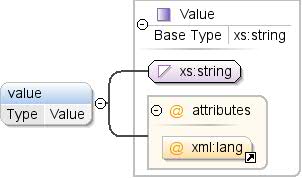Komponente: ValuesGroup
Mit Sammlungen den Überblick behalten
Sie können Inhalte basierend auf Ihren Einstellungen speichern und kategorisieren.
| Namespace |
http://schemas.google.com/dspl/2010 |
| Diagramm |
 |
| Typ |
Wert |
| Attribute |
| content: |
komplex |
| minOccurs (Mindestanzahl): |
0 |
| maxOccurs: |
unbegrenzt |
|
| Attribute |
| QName |
Typ |
Behoben |
Standard |
Verwenden |
Annotation |
| lang |
|
|
|
optional |
|
|
| Quelle |
<xs:element name="value" type="Value" minOccurs="0" maxOccurs="unbounded"/>
|
Element: ValuesGroup / conceptValue
| Namespace |
http://schemas.google.com/dspl/2010 |
| Diagramm |
 |
| Attribute |
| content: |
komplex |
| minOccurs (Mindestanzahl): |
0 |
|
| Attribute |
| QName |
Typ |
Behoben |
Standard |
Verwenden |
Annotation |
| Konzept |
xs:QName |
|
|
erforderlich |
|
|
| Quelle |
<xs:element name="conceptValue" minOccurs="0">
<xs:complexType>
<xs:attribute name="concept" type="xs:QName" use="required"/>
</xs:complexType>
</xs:element>
|
| Namespace |
Kein Namespace |
| Typ |
xs:QName |
| Attribute |
| verwenden Sie zum Beispiel: |
erforderlich |
|
| Verwendet von |
|
| Quelle |
<xs:attribute name="concept" type="xs:QName" use="required"/>
|
| Namespace |
Kein Namespace |
| Annotationen |
Die Kennzeichnung der Tabellenspalte. |
| Typ |
LocalId |
| Attribute |
| verwenden Sie zum Beispiel: |
erforderlich |
|
| Attribute |
|
| Verwendet von |
|
| Quelle |
<xs:attribute name="id" type="LocalId" use="required">
<xs:annotation>
<xs:documentation>The identifier of the table column.</xs:documentation>
</xs:annotation>
</xs:attribute>
|
| Namespace |
Kein Namespace |
| Annotationen |
Der Datentyp der Tabellenspalte. Alle Werte der Spalte in
muss die Tabelle diesem Datentyp entsprechen. |
| Typ |
DataType |
| Attribute |
| verwenden Sie zum Beispiel: |
erforderlich |
|
| Attribute |
| Aufzählung |
String |
|
| Aufzählung |
float |
|
| Aufzählung |
Ganzzahl |
|
| Aufzählung |
boolean |
|
| Aufzählung |
Datum |
|
| Aufzählung |
Konzept |
|
|
| Verwendet von |
|
| Quelle |
<xs:attribute name="type" type="DataType" use="required">
<xs:annotation>
<xs:documentation>The data type of the table column. All values of the
column in the table must conform to this data type.</xs:documentation>
</xs:annotation>
</xs:attribute>
|
| Namespace |
Kein Namespace |
| Annotationen |
Ein Format für die Spalte, das zum Parsen einer Textdarstellung verwendet wird
der Werte. Datumsformate werden definiert durch:
http://joda-time.sourceforge.net/api-release/org/joda/time/format/DateTimeFormat.html |
| Typ |
xs:string |
| Attribute |
| verwenden Sie zum Beispiel: |
optional |
|
| Verwendet von |
|
| Quelle |
<xs:attribute name="format" type="xs:string" use="optional">
<xs:annotation>
<xs:documentation>A format for the column, used to parse a textual
representation of the values.
Date formats are defined by:
http://joda-time.sourceforge.net/api-release/org/joda/time/format/DateTimeFormat.html</xs:documentation>
</xs:annotation>
</xs:attribute>
|
Element: Gruppenwertegruppe
| Namespace |
http://schemas.google.com/dspl/2010 |
| Annotationen |
Eine Gruppe atomarer Werte. Es darf höchstens ein Wert pro
Sprache (Attribut xml:lang) und höchstens einen Wert ohne Sprache. Alle
Werte sind entweder Wertelemente oder conceptValue-Elemente. |
| Diagramm |
 |
| Verwendet von |
|
| Modell |
Wert* | conceptValue{0,1} |
| Children |
conceptValue, Wert |
| Quelle |
<xs:group name="ValuesGroup">
<xs:annotation>
<xs:documentation>A group of atomic values. There must be at most one value per locale
(xml:lang attribute), and at most one value with no locale.
All values are either value elements or conceptValue elements.</xs:documentation>
</xs:annotation>
<xs:choice>
<xs:element name="value" type="Value" minOccurs="0" maxOccurs="unbounded"/>
<xs:element name="conceptValue" minOccurs="0">
<xs:complexType>
<xs:attribute name="concept" type="xs:QName" use="required"/>
</xs:complexType>
</xs:element>
</xs:choice>
</xs:group>
|
Erstellt mit dem
oXygen XML Editor
Sofern nicht anders angegeben, sind die Inhalte dieser Seite unter der Creative Commons Attribution 4.0 License und Codebeispiele unter der Apache 2.0 License lizenziert. Weitere Informationen finden Sie in den Websiterichtlinien von Google Developers. Java ist eine eingetragene Marke von Oracle und/oder seinen Partnern.
Zuletzt aktualisiert: 2025-07-25 (UTC).
[[["Leicht verständlich","easyToUnderstand","thumb-up"],["Mein Problem wurde gelöst","solvedMyProblem","thumb-up"],["Sonstiges","otherUp","thumb-up"]],[["Benötigte Informationen nicht gefunden","missingTheInformationINeed","thumb-down"],["Zu umständlich/zu viele Schritte","tooComplicatedTooManySteps","thumb-down"],["Nicht mehr aktuell","outOfDate","thumb-down"],["Problem mit der Übersetzung","translationIssue","thumb-down"],["Problem mit Beispielen/Code","samplesCodeIssue","thumb-down"],["Sonstiges","otherDown","thumb-down"]],["Zuletzt aktualisiert: 2025-07-25 (UTC)."],[],["The `ValuesGroup` element defines a collection of atomic values, either as `value` or `conceptValue` elements. `conceptValue` must specify a `concept` attribute, while `value` can have a `lang` attribute. `ValuesGroup` attributes include `id` (required, up to 64 characters), `type` (required, with data type options), and `format` (optional, for parsing textual values). The `ValuesGroup` must contain one value per locale. The group is used by Table/column and complex types like Attribute and Values.\n"]]


